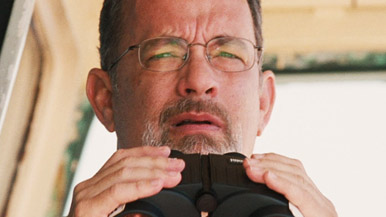Movie Review: Captain Phillips
By Matthew Huntley
October 15, 2013
BoxOfficeProphets.com

And yet, on another level, that the film chooses to play things so straight makes it feel strangely uneventful and irrelevant - as a Hollywood narrative, that is. Don’t get me wrong; by the end, director Paul Greengrass and star Tom Hanks have successfully put us in Phillips’ shoes, and we feel for and care about the man, but I can’t help but wonder if his story would have been better told as a documentary. As a thriller, it lacks thrills, despite its authenticity.
Hanks plays Richard Phillips, captain of the Maersk Alabama, a cargo ship en route to Mombasa, Kenya carrying, among other things, food for starving people, a fact that Phillips no doubt hoped would earn him points and respect with his captors. Days into the ship’s voyage, the captain and crew’s worst fears about traveling around the horn of Africa come true when four pirates, armed with AK-47s, make their way on-board and demand millions of dollars.
Phillips tells the leader of the brigands, Muse (Barkhad Abdi), he can offer them $30,000, but it’s not enough, and a frank conversation between the two men later on lets us see Muse’s motivations aren’t necessarily driven by greed, but because, like Phillips, he too has bosses he needs to keep happy. The reason he and his cohorts are hijacking the ship in the first place isn’t because they’re power hungry or nationalistic, but because it’s their means for survival. To them, it’s simply a job.
Bill Ray’s screenplay works at making us see Phillips and Muse as two similar men who happen to have very different backgrounds (Phillips is from a small town in Vermont, married to Andrea [Catherine Keener] and has two kids; Muse is from Somalia, barely 20, and is trying to work with the cards life has dealt him, although not very well). Both are natural leaders, smart (relatively speaking) and aware of the world’s fierce competition. They know how things work.
After the pirates seize the Alabama, Phillips complies to show them around but is careful not to let them know about his 20-man crew, who are hiding in the bottom deck. As the Somalis lead him at gunpoint, he manages to send his men signals, and when they capture Muse, they offer to exchange him for Phillips, who encourages Muse to take the money, a lifeboat and “call it a day.”
But the chaotic circumstances and heated discussion result in Phillips being taken hostage and when the lifeboat detaches from the ship with only Phillips and the Somalis in it, our hearts sink. The remaining crewmen decide to follow them and there’s never a time when the lifeboat isn’t in the Alabama’s clear site. They alert the authorities, including the US Navy and Navy SEALS, who stress Phillips cannot be taken to Somalia, and devise ways to rescue him.
It’s ironic, but this entire incident, which made headlines in March 2009, almost seemed pre-destined to be a Hollywood thriller. It has a humble, courageous hero; it takes place in dangerous, uncertain territory; it has distinct villains with a clear agenda; and after a certain time, everyone is working against a deadline. As the real events transpired, it was like life was imitating art.
Perhaps this last observation illustrates why Captain Phillips isn’t quite necessary as a narrative. True, it perfectly fits the mold for one, but the way Greengrass implements realism over aggrandizement strangely diffuses it of thrills and excitement, on a superficial level at least. That’s not to say it doesn’t hold our interest, but I think it would have been more captivating to see and hear the real Captain Phillips recount his ordeal and for the filmmakers to provide insight into the world of marauding in this part of the world, or even put the real Muse on-camera (he’s currently serving 33 years in prison). As it is, the film feels genuine, and the cast and filmmakers are fully in command of their respective roles, but if we weren’t aware of this being a true story, would we really care about it? It wants to be a thriller, but as such, it’s just not all that riveting, intense or, honestly, entertaining.
Does this mean if filmmakers want to adapt real-life crises into Hollywood thrillers, they have to apply all the standard, and often manipulative, genre techniques, the way Ben Affleck did (and did well) with Argo? No; they should be taken on a case-by-case basis. I suppose it all depends on the material. Consider, for instance, that Greengrass’ previous effort in this department was United 93, which was a masterful, unaffected film about one of the 9/11 plane hijackings, but unlike Captain Phillips, that tragedy left no survivors to talk about it, which gave it the “luxury,” so to speak, of being speculative.
I would say if any filmmakers are going to adapt a real-life story like Captain Phillips, they need to ask themselves how they can make a credible film that’s equally engaging on a pure movie-going level. No doubt Greengrass and Hanks asked themselves this question; I just don’t think they found the right answer. Captain Phillips earns our respect but doesn’t quite generate an emotional or visceral enough response to recommend.